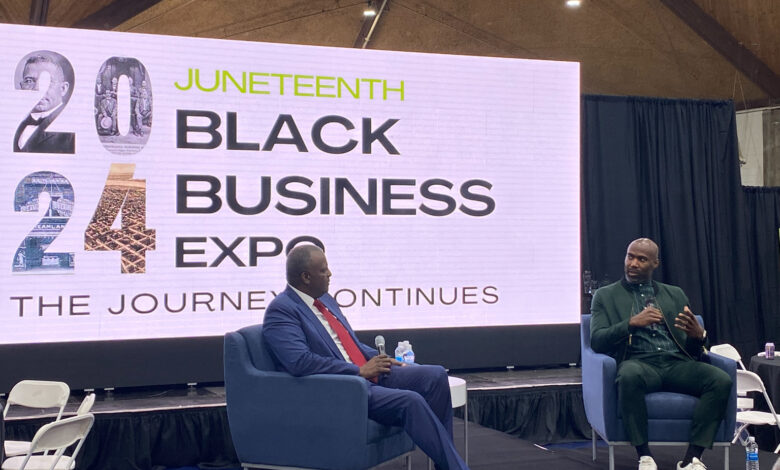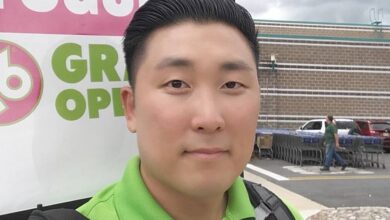Detailed discussion: Former NFL star, entrepreneur and community leader Jenkins offers life lessons

When Malcom Jenkins was growing up in Piscataway, his dad made him up pick up the yard. The work, however, didn’t stop there. Jenkins also had to do the same for the neighbors on the block.
“I learned very early from my father that where you call home is your responsibility,” he said. “He used to make us not only clean up in front of our own home, but he’d make us go two houses down and two houses the other way.
“He said, ‘We’re responsible for our community, that’s our home.’”
Jenkins, the longtime NFL star and two-time Super Bowl champion, offered many poignant thoughts like this on Thursday in a fireside chat during the lunch break portion of the African American Chamber of Commerce of New Jersey’s Juneteenth Black Business Expo, on the Teaneck campus of Fairleigh Dickinson University.
Sure, there was talk about the NFL (wait until you hear what he says about Tom Brady). But it was more about his life as an entrepreneur, investor, author, activist, philanthropist and community leader — and what helped him be successful in all areas.
Jenkins, 36, told the audience attention to detail — and attention to a process — often is the difference in life.
He said he learned the importance of mastering the little things while playing for coach Jim Tressel at Ohio State, when he was playing athletes that were just as talented as he was.
“Coach Tressel taught me that you have to master things that don’t take talent — your effort, your accountability, your preparation and your attitude,” he said. “That way, the only excuse I have if I lose, is somebody had a God-given ability that was just greater than mine. That’s out of my control. But, anything else, I can control, therefore, I should master.”
He said he learned the importance of process be reading the thoughts of Kobe Bryant.
“Kobe said the wins and losses are actually not as important as the process to get there,” he said. “A lot of people have one-time success that they can’t repeat because they don’t have a process to do it.
“A lot of people want to be successful, but have no idea the work that the athlete or the business owner does on a day-to-day basis that separates them. Creating a process is super important. You can control your results more if you have control over your process.”
Jenkins certainly learned that during his NFL career, winning Super Bowls with both the New Orleans Saints and the Philadelphia Eagles.
And, while his Eagles team beat the New England Patriots (and Brady), Jenkins said his respect for Brady is endless. But not for the reason you might think.
In his book, “What Winners Won’t Tell You: Lessons from a Legendary Defender,” Jenkins breaks down what it means to be the greatest of all time.
“We put winning and winners on a pedestal,” he said. “We believe that it’s something that they’re doing that I don’t, there’s something that they have, that I don’t.
“What I found out is, as I’ve kind of failed my way up to success, everybody up there is just like me. They’re normal.”
Except for their attention to detail and process.
“Tom Brady is the greatest quarterback of all time, but he is not the most talented quarterback of all time — at all,” he said. “He actually just does simple better than anybody. He can do the simple, most mundane things better than any other quarterback. And that’s what makes him great. “
Jenkins said that lesson plays in the business.
“Those are the secrets to success. I have a business partner who tells me all the time: ‘Your ideas are a little too big. You just need boring business, boring business for a long time, like compounding interest. That is how you build things.’”
Jenkins touched on a number of subjects during the 40-minute conversation with John Harmon, the founder and CEO of the chamber.
Here are some of his other noteworthy thoughts:
On creating the Malcom Jenkins Foundation (led by his mother)
“We have impact in communities — doing everything from financial literacy to health and wellness seminars to football camps and STEM camps. Our approach, and it’s the vison of my mom, is when we come into a community, we don’t want to just show up and do what we think is best, we want to really meet the communities where the needs are.
“Our programs look different, depending on where we are in the country. We serve four states — Louisiana, Ohio, Pennsylvania and New Jersey — all places that I call home.
On creating the Players Coalition in 2017 (along with NFL star Anquan Bolden) following the efforts of Colin Kaepernick
“It was 12 football players who wanted to have a bigger impact on their communities in social justice, being able to affect policy, public education and to raise funds for the grassroots organizations that we saw doing the work. We had a crazy idea that we could have more impact if we did it collectively. We started with 12 of us, raised millions of dollars in grants for grassroots organizations, we lobbied to push for legislation changes and have gotten policy changes. Since then, we have grown from just 12 players to now over 12 professional sports leagues that represent athletes all over the country.”
On how his book is about his life — but also about preserving Black culture
“I think it’s important for us to understand where we are right now in history. We actively have states banning books that contain our history, contain our lessons — all the things that we would want our next generation to know. In the entertainment space, the ownership of our stories and the music we listen to aren’t necessarily being pushed out by us. And, if you go into the art space, there’s a gold rush right now on Black art, and it is not us who is collecting it.
“I’ve become really passionate about spreading the word and maintaining our history and our voices and our stories, because when you don’t own the mainstream, the word of mouth is how our tradition and our ethos carries forward. Sometimes, when we’re in the hustle and bustle trying to keep up with the Joneses, we forget that we are not the Joneses.
“For me, this book is one of the ways to do that. They say, ‘If you want to hide something from Black folks, put it in a book.’ Even if that isn’t true, we need to fight against that. For me, it was a question of, ‘How do you unpack me in a way that is not a five-minute ESPN clip, that is not of some sports journalists writing about it? How do I tell my lessons as a Black kid in New Jersey, who went on this journey through the National Football League, and what that taught me and how I related that back to my community, my family, the losses and stresses that go along with it?’
“All the things that I’ve learned are in this book. It’s my way to give back to all of those who are in a community with me and for those who look up to me to understand not only the work that I’ve done, but who I am as a man.”
On what it takes to build a winning team
“It’s similar to leading a great business. Teams that look good on the surface usually have really strong leadership at the top. They might have a great coach, even a great quarterback and some good veteran leadership. But, if there are not leaders integrated vertically, from the very lowest employee to the highest, what you’ll find is that, when you hit the adversity that every company, every team will, your locker room will fracture.
“To become a championship team, the veterans have to all be invested in developing your weakest members. It’s not just on the coaches. That’s why my biggest lesson as a leader is: If you’re going to ask anything to anybody, it needs to be something that you’re willing to do yourself. I’ve always known it to be easier to lead when I’m willing to get in the trenches to do any job that is required. It makes it way easier for me to hold everybody else accountable when they know I’ll do the job myself.”



